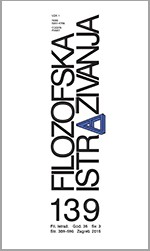Tjelesna ontologija duše i zdravstvena reforma: adventistički zaokret u kršćanskoj antropologiji
Bodily Ontology of the Soul and Health Reform: Adventist Turn In Christian Anthropology
Author(s): Matija KovačevićSubject(s): Anthropology, Metaphysics, Ethics / Practical Philosophy, Early Modern Philosophy, Philosophy of Religion, Biblical studies, Systematic Theology
Published by: Hrvatsko Filozofsko Društvo
Keywords: body; soul; ontological anthropology; Adventist anthropology; Genesis; soma; physicalism; dualism; holism;
Summary/Abstract: Following the spread of Platonic anthropology, Christianity has started, already since the 2nd century A.D., to be dominated by dualism – a trend undisturbed by somewhat more holistic Thomism, and further strengthened by Cartesianism, which distanced Christian theology and soul even further away from the body. During the 1960s, theologians have become aware of the far more positive and inclusive attitude that the Bible has towards the body. Yet, a century before, the Adventist movement was born in conditionalism such as presented by Hobbes in Leviathan (XLIV). Man does not have a soul; he is a “living soul” – a body vivified by the “breath of life” (Gen 2:7). Without the body, there is no life, nor, consequentially, eternal hell. To this Adventists have also conjoined a philosophy of health reform in which the care of the body has a key role, and upon which depends man’s intellectual and spiritual wellbeing. On this foundation, they have built a rich healthcare and educational practice. This physicalist version of Christian anthropology is a unique worldview contribution to philosophy of the body and a subject worthy of academic attention.
Journal: Filozofska istraživanja
- Issue Year: 35/2015
- Issue No: 03/139
- Page Range: 483-491
- Page Count: 9
- Language: Croatian

